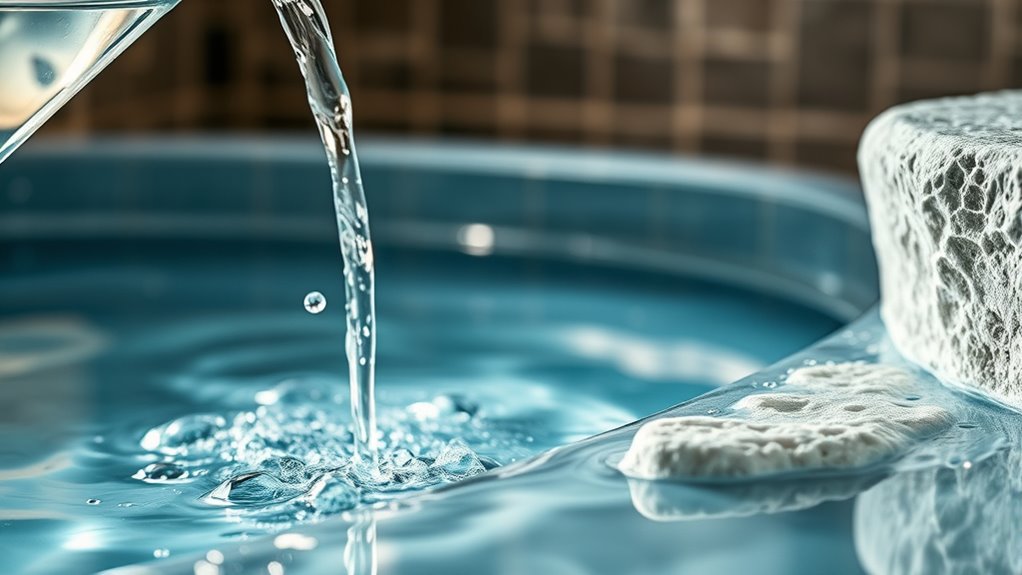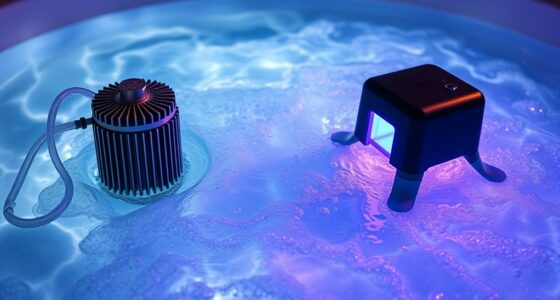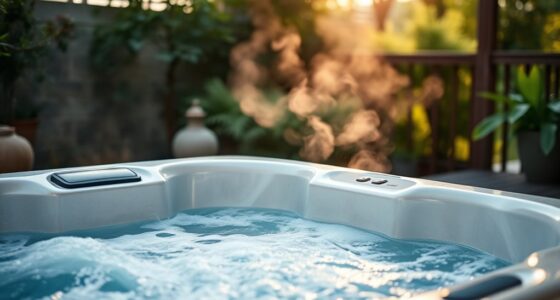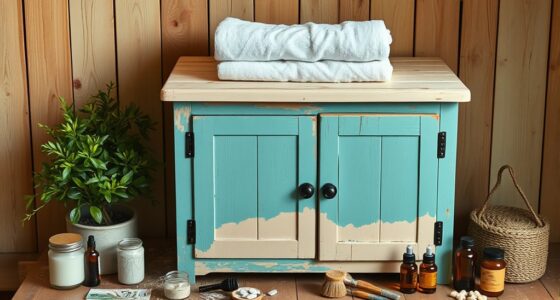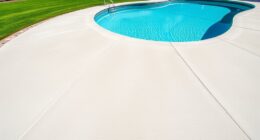To manage soft versus hard water in your spa, first test water regularly to determine mineral levels. Use treatments like water softeners or polyphosphates for hard water to prevent scaling, and maintain proper pH and alkalinity for both types. Keep an eye out for signs like deposits or cloudy water, and perform routine cleaning and water refreshes. Staying on top of water chemistry guarantees your spa stays in top shape—uncover more tips to keep your spa healthy.
Key Takeaways
- Regularly test water mineral levels to determine hardness and adjust treatment strategies accordingly.
- Use water softeners or polyphosphate treatments to reduce mineral buildup in hard water.
- Maintain proper pH and alkalinity to prevent scale formation and equipment damage.
- Drain and clean filters periodically to remove mineral deposits and improve water clarity.
- Monitor water chemistry consistently to balance minerals, enhance safety, and extend spa lifespan.
Understanding Water Types and Their Composition
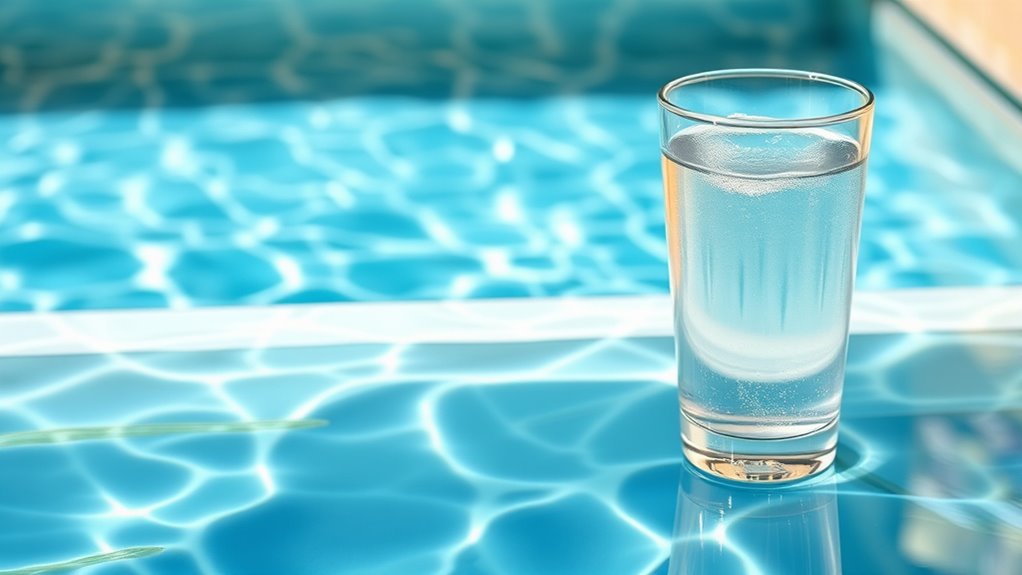
Understanding the different types of water used in spas is essential for proper maintenance. Water can be classified as soft or hard based on mineral content, mainly calcium and magnesium levels. Soft water contains low mineral levels, making it gentle on your spa equipment and easier to treat. Hard water, on the other hand, has higher mineral concentrations, which can lead to scaling and buildup over time. Knowing your water type helps you choose the right water treatment methods and chemicals to prevent damage. Testing kits can quickly identify mineral levels, giving you a clear picture of your water’s composition. Additionally, understanding water quality can help you address other potential issues like corrosion or buildup, ensuring your spa remains in optimal condition. Proper testing and treatment are vital for maintaining equipment longevity, which can be compromised by improper water chemistry. By understanding these differences, you can effectively manage your spa’s water quality, ensuring it stays clean, clear, and safe for use. Regularly monitoring mineral levels can also prevent damage to your spa equipment, extending its lifespan and maintaining optimal performance. Being aware of potential mineral deposits helps in selecting appropriate water softening or conditioning solutions.
Effects of Water Hardness on Spa Equipment and Users
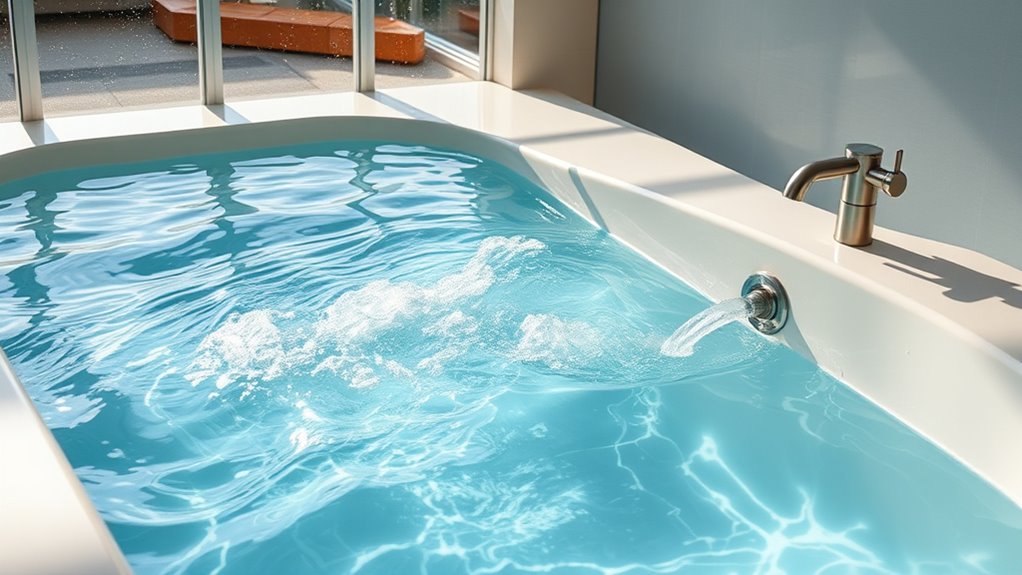
Hard water can considerably impact both your spa equipment and your overall experience. When water is hard, minerals like calcium and magnesium build up inside pumps, heaters, and jets, leading to clogs and inefficiency. This buildup can cause equipment to overheat, break down faster, or require frequent maintenance. For you, hard water may leave your skin feeling dry, itchy, or irritated after a soak, reducing your comfort. It can also diminish the effectiveness of spa chemicals, making it harder to maintain proper water balance. Over time, mineral deposits can stain surfaces and damage seals, leading to costly repairs. Being aware of the effects of mineral buildup can help you take proactive measures to protect your equipment and ensure a more pleasant, relaxing experience. Regular water testing and water softening methods are essential in preventing these issues and prolonging the life of your spa. Additionally, understanding the water hardness levels can help you choose the appropriate treatment to maintain optimal water quality. Using proper water conditioning techniques can significantly reduce mineral accumulation and improve your spa’s longevity.
Identifying Signs of Hard and Soft Water Issues
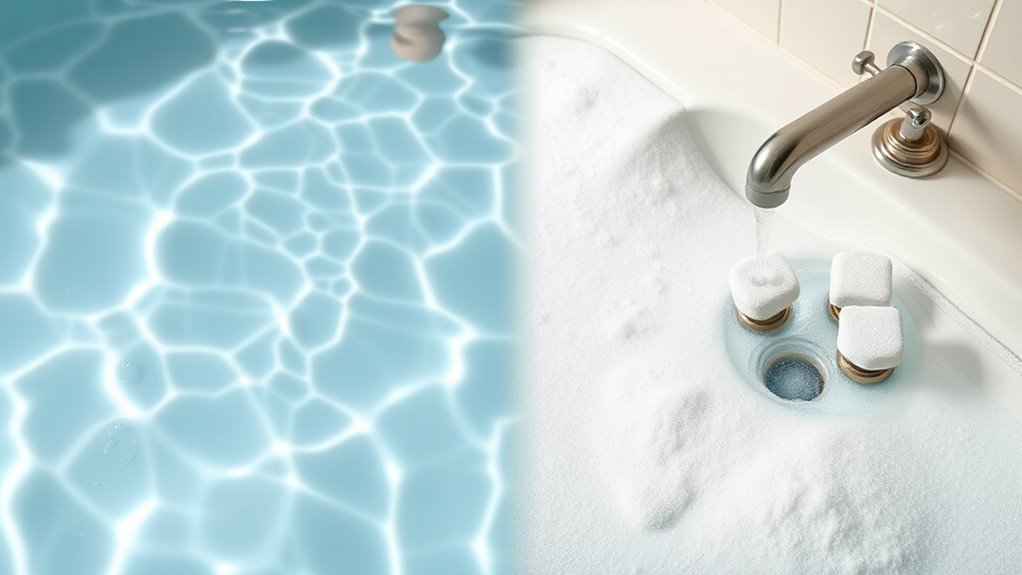
To determine whether your spa has hard or soft water, pay close attention to certain signs and symptoms. If you notice white, chalky deposits around the waterline or on the spa’s surfaces, it’s likely hard water caused by high mineral content. You might also see cloudy water that doesn’t clear easily or experience soap scum buildup after cleaning. Conversely, soft water can cause your skin and eyes to feel irritated, and you may notice the water feels slimy or slippery. Soft water can also lead to corrosion of metal components and equipment. Changes in water clarity, unexpected mineral deposits, or discomfort during use are clear indicators. Recognizing these signs helps you determine if water hardness issues are affecting your spa’s performance and your comfort. Understanding the 16PF traits can also provide insights into how your personality might influence your approach to managing water quality issues. Additionally, being aware of sound healing science and how vibrations can impact health may encourage you to explore natural solutions for water treatment.
Methods for Testing and Measuring Water Quality

Accurately testing and measuring your spa’s water quality is essential for maintaining ideal conditions. Proper testing helps you identify issues early and adjust treatments effectively. You can use various methods to assess water chemistry, guaranteeing your spa stays safe and comfortable. Using vetted testing supplies ensures reliable results and accurate readings. Additionally, investing in proper calibration of testing equipment enhances measurement precision. Regular testing allows you to track changes over time and prevent problems caused by hard or soft water. Incorporating professional water analysis can provide more detailed insights into your water chemistry for optimal maintenance. Understanding water hardness levels is crucial for adjusting your spa treatments accordingly. Regularly monitoring these levels can help you manage your water quality more effectively. Keep a record of your results to better understand your spa’s water chemistry and take timely action when needed.
Strategies for Managing and Treating Hard Water
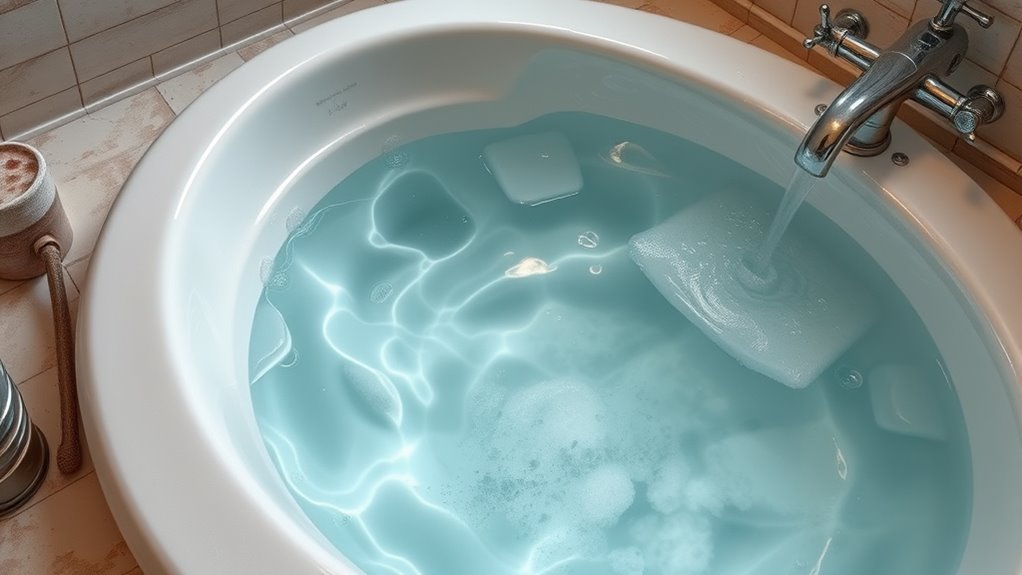
Managing and treating hard water in your spa requires implementing effective strategies to prevent scale buildup and guarantee water clarity. First, regularly test your water’s calcium and mineral levels, and adjust the chemistry as needed. Using a water softener or a polyphosphate treatment can help reduce mineral concentrations that cause scaling. Consider installing a scale inhibitor or using a commercial water conditioner designed for spas. Maintaining proper pH and alkalinity levels also prevents mineral deposits from forming. Regularly draining and refilling your spa helps dilute accumulated minerals. Additionally, cleaning filters and surfaces prevents mineral deposits from settling. Recognizing soulmate angel numbers can also be a helpful tool for understanding your romantic journey and timing. Maintaining proper water chemistry is essential for optimal spa operation and water quality. Regular monitoring with a reliable water testing kit can significantly improve your water management routine. Incorporating proactive water treatment methods can further enhance water quality and reduce maintenance efforts. Implementing home decor principles such as organized and functional wall systems can aid in maintaining a clean environment around your spa area. These strategies help keep your water balanced, extend equipment lifespan, and ensure a pleasant, crystal-clear spa experience.
Maintenance Tips for Protecting Your Spa From Water-Related Problems
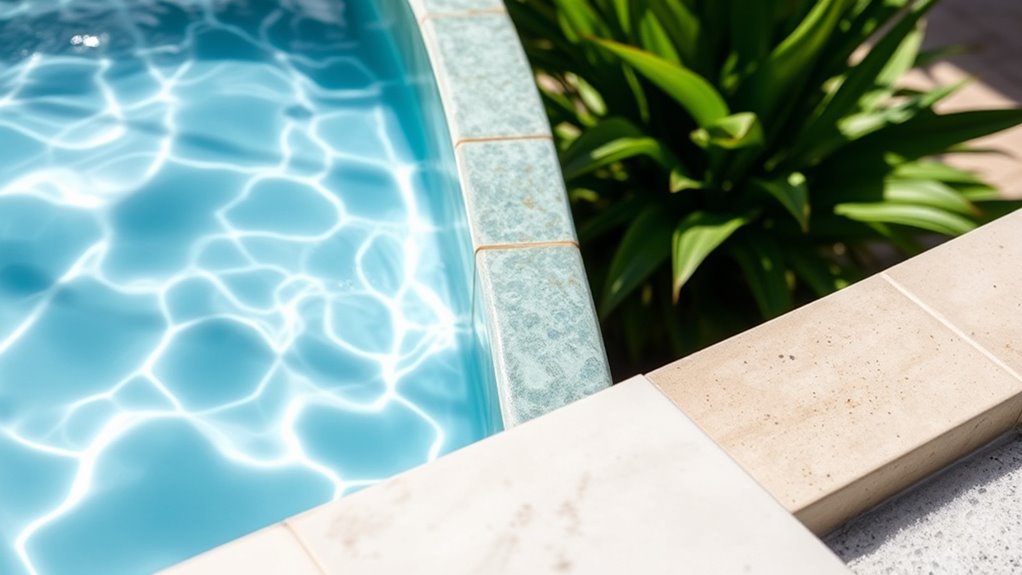
To keep your spa in top shape, start by testing your water’s hardness regularly to catch issues early. You’ll also want to maintain proper water balance, adjusting chemicals as needed to prevent damage and buildup. Consistent monitoring and adjustments will help protect your spa from common water-related problems. Incorporating water quality management can also assist in anticipating potential issues before they arise, ensuring smoother maintenance routines. Being aware of water chemistry is essential for comprehensive spa care. Additionally, understanding water hardness levels can help prevent scaling or corrosion, prolonging the lifespan of your spa components.
Water Hardness Testing
Testing your spa’s water hardness regularly is essential to prevent damage and guarantee ideal performance. Hard water can cause scale buildup, while soft water may lead to corrosion. Using a reliable test kit helps you monitor levels accurately. Simply collect a water sample and follow the kit instructions for quick results. Keep an eye out for signs like mineral deposits or changes in water clarity. Adjust your water treatment accordingly to maintain balanced hardness levels. Regular testing makes it easier to catch issues early and avoid costly repairs. Remember, maintaining proper water hardness is key to extending your spa’s lifespan and ensuring a comfortable soak. Stay proactive by testing at least once a month, especially during seasonal changes or after adding new water.
Regular Water Balancing
Regularly balancing your spa’s water is essential to prevent costly issues and keep your equipment running smoothly. You should monitor and adjust pH, alkalinity, and sanitizer levels weekly to maintain ideal water chemistry. Proper balance prevents scale buildup in hard water and corrosion in soft water, protecting your spa’s components. Use test strips or a testing kit to check levels consistently. If you notice imbalances, add the appropriate chemicals—such as pH increasers or reducers—to correct them promptly. Maintaining proper water balance also improves water clarity and prevents skin irritation. Don’t ignore small fluctuations; addressing them early saves you time and money. Regular water balancing is the foundation of a trouble-free spa experience, ensuring your soak remains relaxing and safe.
Frequently Asked Questions
How Often Should I Test My Spa Water for Hardness Levels?
You should test your spa water for hardness levels at least once a week to ensure ideal balance. Regular testing helps you catch any changes early, preventing damage to your spa’s equipment and maintaining water comfort. If you notice significant shifts or after heavy usage, test more frequently. Using a reliable test kit makes it easy to monitor and adjust hardness levels, keeping your spa in perfect condition.
Can Water Softeners Harm Spa Equipment Over Time?
Water softeners can harm your spa equipment if not used properly. Over time, they may cause corrosion or damage to sensitive parts due to increased sodium levels or altered pH balance. You should regularly monitor your water chemistry and use appropriate softening methods. Proper maintenance, such as balancing pH and alkalinity, helps prevent damage. If you’re unsure, consult a professional to guarantee your spa stays in good condition.
What Are Natural Alternatives to Chemical Water Treatments?
Imagine a crystal-clear lake, untouched and pure—nature’s way of keeping water pristine. You can achieve this in your spa with natural alternatives like mineral balancing, using natural clarifiers such as aloe vera or tea tree oil, and maintaining proper filtration. Regularly check pH levels and clean filters. These methods gently preserve water quality without harsh chemicals, creating a healthier, more inviting spa experience for you to enjoy.
How Do Mineral Deposits Affect Spa Water Aesthetics?
Mineral deposits can substantially impact your spa’s appearance by creating cloudy water and streaks or stains on surfaces. These deposits, often from hard water, can make your spa look dirty even when it’s clean. They also reduce water clarity and can clog filters. To keep your spa looking its best, you need to regularly check mineral levels and use appropriate water treatments to prevent buildup and maintain a clear, inviting appearance.
Are There Specific Spa Models Better Suited for Hard or Soft Water?
Imagine finding the perfect spa experience—you wonder if certain models cater better to your water type. Some spas are built with features that handle mineral-rich, hard water gracefully, reducing buildup and maintenance. Others excel with soft water, offering gentler treatment and fewer scale issues. By choosing a model designed for your water’s characteristics, you guarantee a more enjoyable, trouble-free soak, making relaxation truly effortless.
Conclusion
By mastering water management, you’ll transform your spa experience from chaos to pure bliss. Don’t let hard water wreak havoc on your equipment or turn your relaxing oasis into a nightmare. With the right knowledge and proactive care, you can conquer water issues before they spiral out of control. Take charge today—your spa, your sanctuary—deserves nothing less than perfect, crystal-clear water. Plunge in confidently and enjoy a flawless, worry-free escape every single time!

